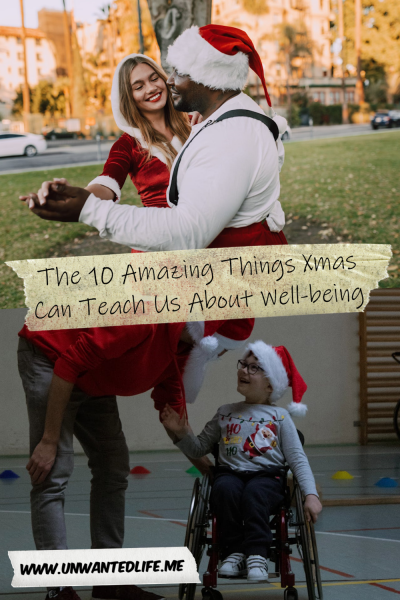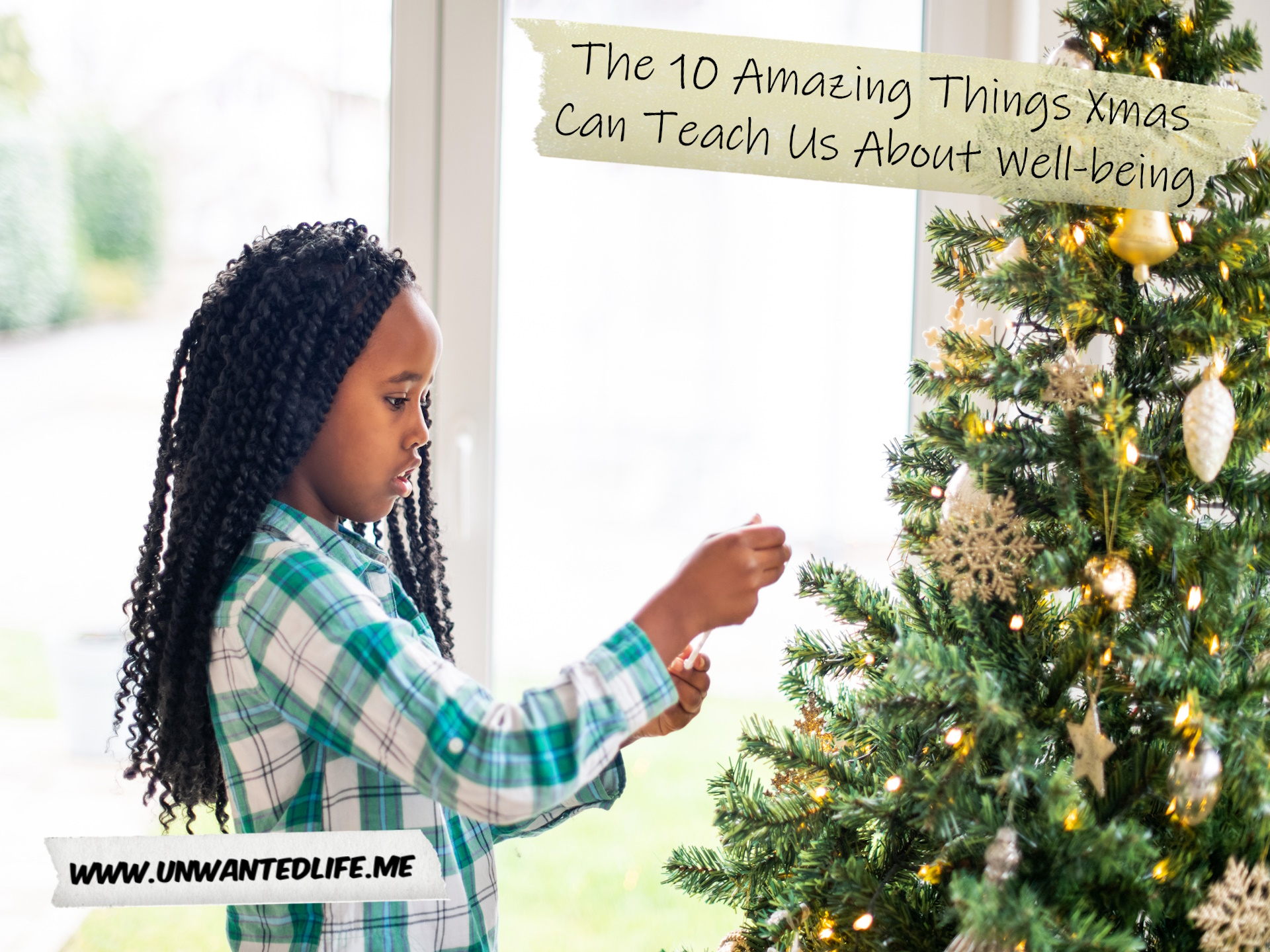Xmas (Christmas) comes around once a year. It is a time that can bring us together and one of the few times we actually get the day off work, for most of us at least. Xmas (Christmas) can be a great time of year and there’s a lot we can learn from this time of year that we can use for the rest of the year. Thus, this article will teach you what you can learn from Xmas (Christmas) to use as self-care and to manage your wellbeing all year round.
What Is Xmas?
According to Dictionary.com, the abbreviation of Xmas to represent Christmas dates back to the mid-16th century, coming from the Greek word Χριστός (Chrīstos = “Christ”). So it wasn’t intended to separate Christ from Christmas, which is often the complaint some Christians make. But words change and that’s why I used to prefer to say Xmas, ironically, as I’m an atheist. Now I generally use happy holidays to be more inclusive.
And for the purpose of my blog, it’s a keyword I’ve not used before which is good for my SEO.
What We Can Learn From Xmas
Breaking bread
Spontaneously, on Christmas Day 1914, a football match took place between British and German soldiers. And for some soldiers on the Westen Front, for a single day at least, peace reigned. If soldiers were able to play a football match with those they were told were their enemies during World War 1, then there’s certainly something we can learn from the Xmas (Christmas) spirit too.
So what can we learn from that? Well, even when in the pits of hell itself, people want to live in peace and connect with others. Maybe it’s time to forgo the anger and hate, let go, and seek a better alternative by connecting with people.
Sharing
There’s something else we can learn from this limited cease-fire during the Xmas (Christmas) of World War 1, and that’s the sharing of our limited resources, regardless of our differences.
Appreciating the present
Instead of dwelling on the past or worrying about the future, be mindful of each festive moment. The festive holiday season encourages being present in the moment, whether you’re decorating the tree or enjoying a holiday meal. Given that practising mindfulness is a key aspect of self-care, helping you reduce stress and anxiety, it’s important you don’t confine that to Xmas (Christmas) and the festive holidays. Apply it to your life all year round.

Express gratitude
During Xmas (Christmas), it’s easier to notice all the gifts, big and small, that you’ve been given, which makes it easier to let your loved ones know you’re grateful. But again, why stop at expressing gratitude to one day a year? Spend your whole life expressing gratitude for all the little and big things that happen in your life, because if you do, you’re far more likely to feel happy with your life.
This is an important lesson from both Xmas (Christmas) and positive psychology. Linley and Harrington (2006) listed gratitude as one of positive psychology’s six virtues. Just like Xmas (Christmas) encourages gratitude, self-care should involve practising gratitude all year round, which can boost overall well-being and mental health.
Reflection and planning
The end of the year is a natural time to reflect on the past and plan for the future. Especially on New Year’s Eve, when we often declare our New Year’s resolution. The problem with New Year’s resolutions is that they’re often doomed to fail. However, that doesn’t mean you can’t use that spirit to better yourself throughout the year, setting more realistic SMART-based goals, rather than lofty New Year’s resolutions. So make your wellbeing a priority all year by creating SMART goals.
Self-compassion
Xmas (Christmas) can teach us the value of self-compassion because it’s the time of year when people appear to show the most compassion. Just as we forgive and show understanding toward others during the festive holiday season, it’s important to treat ourselves with the same kindness and forgiveness, not just for Xmas (Christmas), but all year round.
Rest and relaxation
Xmas (Christmas) often includes time off work and opportunities to relax, at least for those not cooking the Christmas dinner. It’s pretty much the one day a year we universally get off in the West. Rest and relaxation are important, but they shouldn’t be reserved for this one day a year. Self-care involves recognising the importance of rest and relaxation for physical and mental health and applying that throughout the year. Your stress levels will thank you for it.
Building memories
We can often find it more rewarding to give, rather than receive, because we can build memories of other people’s reactions, no more so than watching a child react with joy to the opening of the Xmas (Christmas) present they received. A lot of our most important memories will come from our Xmas (Christmas) experiences throughout the years. But it’s also important to build memories at other times as well.
Too often we just go through the motions for the rest of the year, but that doesn’t make us happy. Instead, try to focus on building memories, and that doesn’t always require spending large sums of money. There are many ways to build treasured memories that don’t require throwing money at it.
Family and connection
Xmas (Christmas) emphasises the importance of spending time with loved ones. But let’s not leave that to a once-a-year activity. Make sure your self-care involves nurturing meaningful relationships and understanding the value of social support for your well-being. It doesn’t have to be with family, because not everyone gets to pick their family, but you can pick your friends who make up your second family.
Giving and receiving
The act of giving and receiving during the festive holiday season can teach us about balance in self-care. It’s important to both give to others and receive care and support from them. It’s also important to find a balance in life in general, rather than denying ourselves treats like a cake here and there because they’re not “healthy”. They may not be healthy, but they are pleasurable, and pleasure is important to our wellbeing as well when done in moderation.
Summary
Xmas (Christmas) is a special time of year, whether you’re religious or not. It’s a key part of Western culture. Because it’s such a big part of our way of life, there are a lot of lessons that we can learn from this festive time of year, important lessons we should apply throughout the year. There’s no reason we should reserve these benefits for Xmas (Christmas) and New Year’s Eve. I hope my article helps you embrace all that’s good with this time of year so you can apply it all year round for a better quality of life.
Happy Holidays everyone!
As always, leave your feedback in the comments section below. Also, please share your experiences with Xmas (Christmas) and what you learned from the festive holiday in the comments section below as well. Don’t forget, if you want to stay up-to-date with my blog, then sign up for my newsletter below. Alternatively, get push notifications for new articles by clicking the red bell icon in the bottom right corner.
Lastly, if you’d like to support my blog, you can make a donation of any size below. Until next time, Unwanted Life readers.
References
Linley, P.A. & Harrington, S. (2006). Playing to your strengths. The Psychologist, 19, 86–89. Retrieved from https://www.researchgate.net/publication/281315684_Playing_to_your_strengths.


I need to share your post explaining “X”mas with a few people who I got into a debate about this time last year. I wrote a post about not being offended when people wish me Happy Holidays and it sparked a whole discussion about the “demise of Christmas”. I tried to explain it but they weren’t having it.
Happy Holidays to you!
Might not be worth the effort to argue with people who think there’s a war on Christmas or that it’s somehow dying out as a holiday
Happy holidays to you too
Yes. It’s really not worth the energy!
very interesting knowing about the football match, you explained it well to know how it can help with our well being.
I doubt we’ll see something like that happen again
Thank you for writing this incredible post! Christmas is about harmony, peace, love and being grateful.
Thanks for commenting
Thanks for writing another great article. I especially liked the part about self-compassion. I think too often people build up unrealistic expectations for themselves and then tend to feel upset with themselves if they can’t fulfill them. Good reminders here!
It doesn’t help with how easy it is to compare ourselves to others, meaning it’s a lot easier to develop unrealistic expectations that set us up for failure. Thanks for commenting
I love Christmas time because I get a lot of self care products.